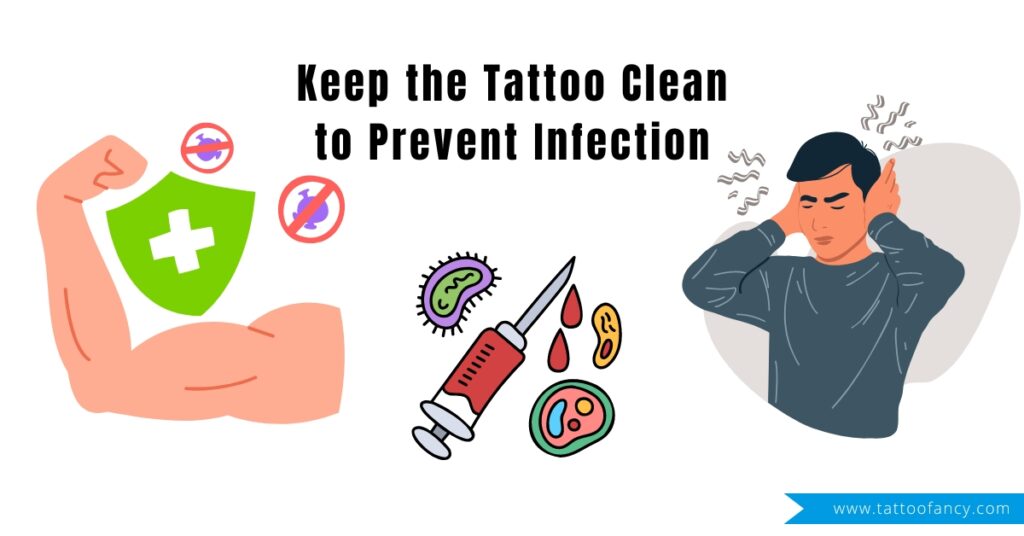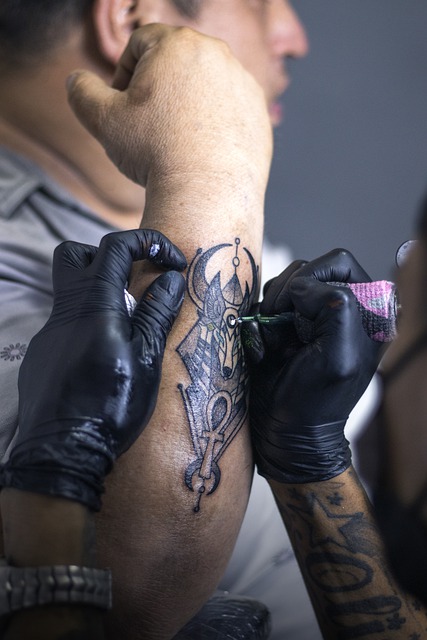Getting a new tattoo can be an exciting experience, but ensuring that it heals properly and looks its best requires proper aftercare. A new tattoo is essentially an open wound, and as such, it requires special care to avoid infection, scarring, and fading. By following a few simple steps and staying diligent with aftercare, you can ensure that your new tattoo looks pristine for years to come. In this article, we’ll outline some helpful tips on how to care for your new tattoo to ensure its longevity and vibrancy.
It is important to remember that everyone’s body reacts differently to tattoos, and proper care will vary depending on the individual and the location of the tattoo. If you notice any signs of infection or if you have any concerns, contact your tattoo artist or a healthcare professional.
Keep the Tattoo Clean to Prevent Infection

When getting a tattoo, it is important to keep the area clean to prevent infection. This includes washing the tattoo with mild soap and water several times a day to remove any dirt or debris that may have accumulated on the skin. It is also important to avoid touching the tattoo with dirty hands and wear loose clothing to prevent friction.
To ensure proper healing, it is important to follow the aftercare instructions provided by your tattoo artist. This may include keeping the tattoo covered with a bandage or wrap for a few hours after the procedure and using a healing ointment as directed. Avoid swimming, soaking in hot tubs, or exposing the tattoo to direct sunlight until it has fully healed.
In the event that you notice any signs of infection, such as redness, swelling, or discharge, it is important to seek medical attention immediately. Untreated infections can lead to serious health complications and may even require surgery to treat. By taking proper care of your tattoo and seeking medical attention if necessary, you can help ensure that your new ink heals properly and looks great for years to come.
Apply Ointment or Lotion to Hydrate the Tattoo
After getting a tattoo, it is important to provide proper aftercare to ensure that the tattoo heals properly and looks vibrant. One crucial step in aftercare is applying ointment or lotion to hydrate the tattoo. This helps to promote healing and prevent itching and scabbing. Additionally, hydrated skin is less likely to peel or flake, which can lead to tattoos fading or becoming patchy.
When selecting an ointment or lotion to use on your tattoo, it is important to choose a product that is specifically designed for tattoos. These products are often fragrance-free and made with natural ingredients, which can help to prevent irritation or allergic reactions. Some recommended tattoo ointments include Aquaphor Healing Ointment, Tattoo Goo, and H2Ocean. These ointments can be applied 2-3 times a day or as directed by your tattoo artist.
To apply the ointment or lotion, first wash your hands thoroughly with soap and water. Gently pat dry your tattoo with a clean towel before applying the ointment or lotion. Use just enough to cover the tattoo, but avoid using too much as it may cause excess moisture buildup. It is important to also avoid touching your tattoo excessively or picking at any scabs or peeling skin, as this can cause damage to the tattoo and hinder its healing process. By following these simple steps, you can ensure that your tattoo stays hydrated and healthy, resulting in a beautiful and long-lasting piece of art.
Protecting Your Tattoo from Prolonged Sun Exposure
When it comes to protecting your tattoo from prolonged sun exposure, there are a few things you can do to keep it looking fresh and vibrant for years to come. First and foremost, it’s important to avoid direct sunlight during peak hours (10 am to 4 pm) when the sun’s rays are the strongest. If you must be outside during these hours, seek shade or wear protective clothing that covers your tattoo.
Another essential step in protecting your tattoo from sun damage is to apply sunscreen regularly. Choose a broad-spectrum sunscreen with an SPF of at least 30 and apply it generously to your tattooed area. Be sure to reapply every two hours or after swimming or sweating. Avoid using tanning oils and lotions as they can cause further damage to your tattoo.
Lastly, it’s important to keep your tattoo clean and well-moisturized. Use a gentle, fragrance-free soap to clean the area and apply a high-quality tattoo balm or cream to keep it hydrated. This will help prevent fading and keep your tattoo looking bright and vibrant for years to come. Remember, taking good care of your tattoo will not only protect it from sun damage but also maintain its overall quality and appearance.
Avoiding Prolonged Water Submersion for Your Tattoo
When you get a tattoo, it’s important to properly care for it to ensure it heals correctly and looks its best. One key aspect of aftercare is avoiding prolonged water submersion. When your tattoo is still new, it needs time to heal and form a protective layer of skin over the ink. If it is submerged in water for too long, it can damage the skin, cause the ink to fade, and even lead to infection.
To avoid prolonged water submersion for your tattoo, it’s important to keep it dry for the first two weeks after getting it. This means avoiding swimming, taking baths, and even letting water run over it during a shower. When you do shower, you can cover your tattoo with a plastic wrap or a waterproof adhesive bandage to protect it. After two weeks, you can start to slowly reintroduce water to your tattoo, but you should still be cautious.
If you absolutely must submerge your tattoo in water, such as for a pool party or beach day, there are products available that can help protect it. Tattoo-specific waterproof bandages or sprays can help create a barrier between your tattoo and the water to prevent damage. Remember to always carefully follow the instructions provided with these products and avoid submerging your tattoo for too long, even with protection. By taking these precautions, you can ensure your tattoo stays looking its best for years to come.
Do Not Pick or Scratch Scabs Over the Tattoo
Scabs can form over a new tattoo as part of the healing process, and they are a natural occurrence. It is essential to keep the scabs intact and avoid picking or scratching them over the tattoo. Picking or scratching can cause the scab to break open prematurely, which can interfere with the healing process and even cause scarring. Moreover, it can also introduce germs and bacteria into the open wound, leading to infections that can be dangerous.
To prevent yourself from scratching or picking at the scabs over the tattoo, you can apply a thin layer of unscented and non-comedogenic lotion to keep the area hydrated. You can also use a clean and damp cloth to gently clean the area around the scab. The key is to avoid pulling or rubbing the scab, as this can cause it to break open. It is crucial to allow the scab to fall off naturally, which can take a few weeks.
After the scab falls off, you may notice that the tattoo is still peeling or flaking. You should avoid picking or scratching any of the dead skin cells that are falling off during this phase, as this can also cause damage to the tattoo. Simply apply moisturizer to the area to help soothe the skin and minimize any itching or discomfort. Remember to take good care of your tattoo during the healing process to ensure it stays looking beautiful for years to come.
Wear Loose Clothing to Prevent Irritation
When it comes to avoiding skin irritation, one of the simplest solutions is to wear loose clothing. Tight-fitting clothes can rub against the skin, causing friction and irritation. To prevent this, opt for clothing that fits loosely and allows your skin to breathe. Loose clothing helps to reduce the amount of friction on your skin, which can ultimately help to prevent skin irritation from occurring.
It’s also important to consider the type of fabric that your clothing is made from. Certain fabrics, such as wool or synthetic materials, can be particularly irritating to the skin. Therefore, it’s best to choose clothes made from natural, breathable fabrics like cotton, linen or silk. These fabrics are lightweight and allow air to circulate around your skin, reducing the likelihood of irritation.
Finally, it’s important to note that while loose clothing can help to prevent skin irritation, it’s not a cure-all solution. Other factors such as sweating, allergies, and sensitivity can also contribute to skin irritation. Therefore, it’s important to practice good skincare habits like washing regularly and using hypoallergenic products. With these measures in place, you can keep your skin healthy and prevent the discomfort of skin irritation.
Avoid Exercising or Sweating Excessively for the First Few Days
Exercising or sweating excessively can be very harmful during the first few days after an injury or illness. This is because your body needs time to heal and recover, and physical activity can put additional strain on your already weakened system. If you have recently suffered an injury or illness, it is important to take a break from exercising or engaging in any other strenuous physical activity until you are fully healed.
During the first few days after an injury or illness, your body is working hard to repair itself. You may be experiencing pain, inflammation, and swelling in the affected area, and your immune system is working to fight off any infection or disease. Exercising or sweating excessively during this time can put additional stress on your body, which can slow down the healing process and even cause further damage.
To ensure that you are giving your body the best possible chance to heal, it is important to avoid exercising or sweating excessively for the first few days after an injury or illness. This means taking a break from your regular workout routine, avoiding any activities that raise your heart rate or cause you to perspire heavily, and focusing instead on gentle stretching, rest, and plenty of hydration. With a little bit of patience and self-care, you can help your body heal quickly and get back to your normal routine in no time.
In conclusion: Caring for a new tattoo is not only vital for ensuring its longevity but also for maintaining good hygiene and preventing infections. It’s important to follow the aftercare instructions provided by your tattoo artist and avoid exposing the tattoo to direct sunlight, swimming pools or hot tubs, and excessive rubbing or scratching. Remember to keep the tattoo clean and moisturized, and avoid picking at any scabs or peeling skin. With proper care, your new tattoo will heal beautifully, and you’ll be able to enjoy it for years to come. Happy tattooing!
In conclusion, taking care of a new tattoo is crucial for the healing and longevity of the design. Treating the area gently, keeping it clean, and moisturizing are important steps to follow in the aftercare process. It’s also essential to avoid exposing it to direct sunlight, swimming pools, and hot tubs while it’s healing. By following the aftercare instructions provided by your tattoo artist, you can ensure that your new tattoo looks great for years to come.


